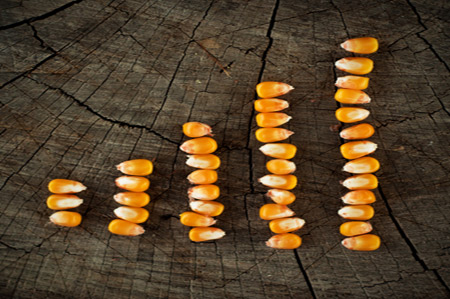Farmers Surprised with Better-Than-Expected Yields
Category: Miscellaneous
 (Ag Professional) – As combines roll through the countryside farmers are seeing the fruits of their labor pay off—or the pain of Mother Nature and management’s final sting. For many farmers, however, the pain is minimal as yields exceed expectations.
(Ag Professional) – As combines roll through the countryside farmers are seeing the fruits of their labor pay off—or the pain of Mother Nature and management’s final sting. For many farmers, however, the pain is minimal as yields exceed expectations.
“We’ve been really fortunate,” says Dale Hadden, corn and soybean farmer in Illinois. “We’ve harvested about 350 acres of corn and [yield] stayed in the low 200 range.”
Right now he’s harvesting corn that wasn’t replanted—he’d only expected 180 to 200 bu. per acre to serve as top end yield, and he’s beating that by 30 to 40 bu. per acre.
“We have a lot of replant, and replanted replant—that’s still pretty green and needs some time to mature. We’re not sure what we’ll pull off of that,” he adds. “We’re switching to soybeans tomorrow, a couple growers said they cut a few acres last week and were pleased with the yields—mid 60s.”
Northwest of Hadden, farmers in parts of Iowa lucked out with rain and are finding yields that meet USDA expectations.
“I’m on really light soil but we’ve been in an area of Iowa that had pretty good rain until Aug. 25,” says Iowa corn and soybean farmer Brent Judisch. “USDA had us pegged at 203 and I think they’re going to be spot on.”
Judisch hasn’t broken out the bean head just yet. Farmers south of him are seeing decent yields, but eight to 10 bu. per acre lower than last year.
Farmers in Kentucky are making their way into corn harvest to find what could be record-setting yields. “Corn is phenomenal this year,” says Quint Pottinger, farmer in Kentucky. “We had good heat and rain all through July and just kept getting those 1 to 1.5 inch rains every week and a half.”
He said that rain helped make grain, but also promoted diseases such as Southern Rust. Farmers who sprayed fungicide he expects will have stellar corn yields. However, the state had a recent cold snap that might mean soybeans aren’t quite record breaking.
“For about two weeks [we were] down into the 50s—it just shut our beans down,” Pottinger says. “We have at least another two weeks before bean [harvest].”




